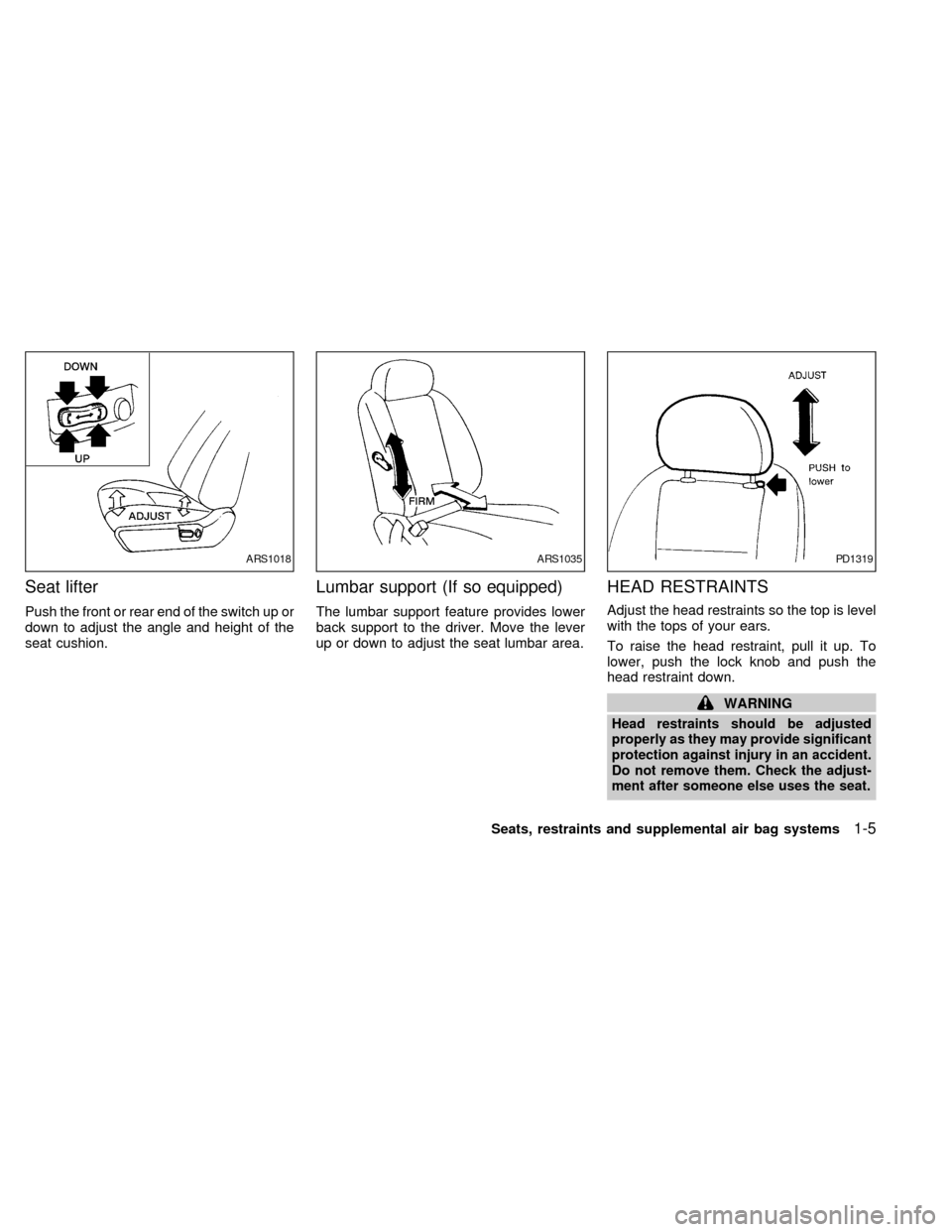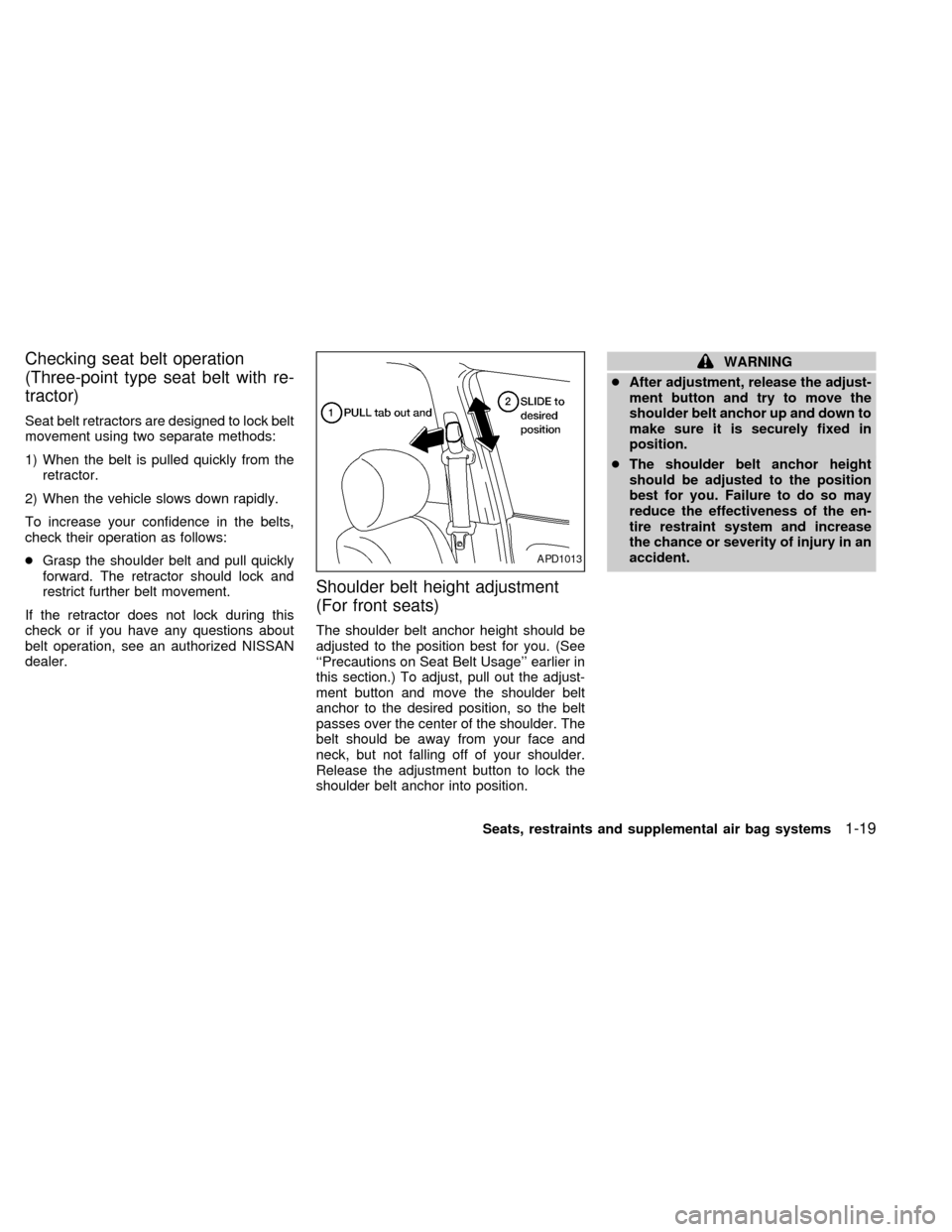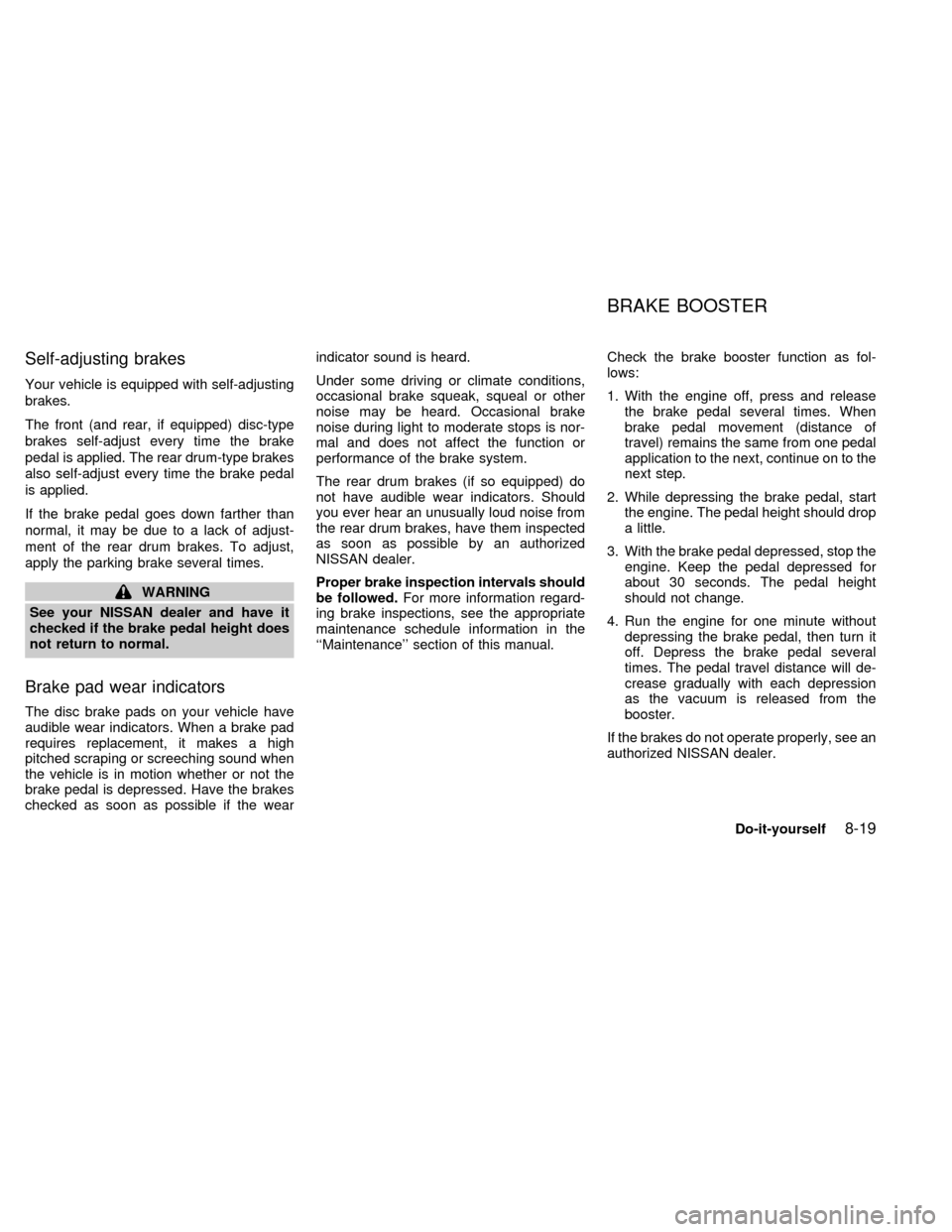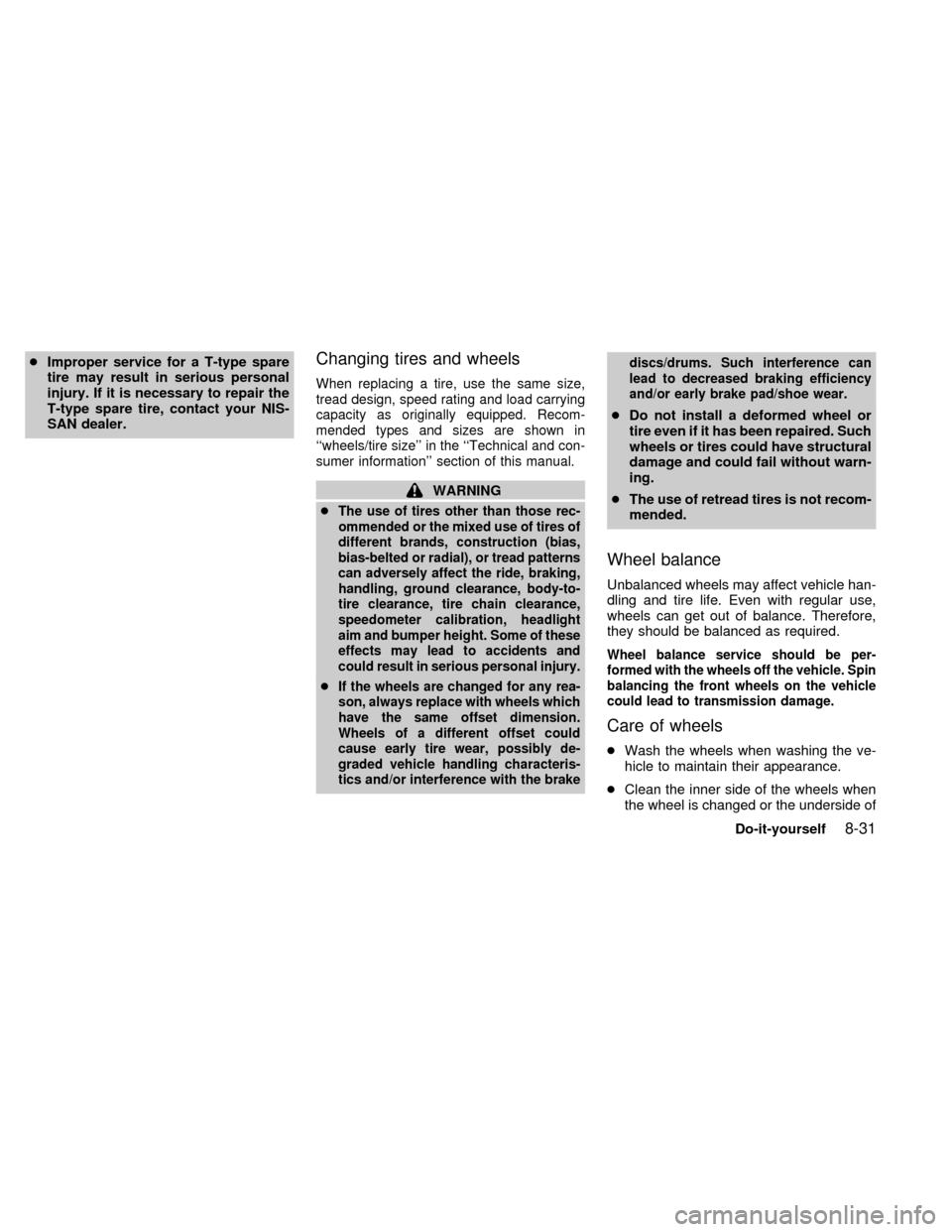1998 NISSAN ALTIMA height
[x] Cancel search: heightPage 12 of 217

Seat lifter
Push the front or rear end of the switch up or
down to adjust the angle and height of the
seat cushion.
Lumbar support (If so equipped)
The lumbar support feature provides lower
back support to the driver. Move the lever
up or down to adjust the seat lumbar area.
HEAD RESTRAINTS
Adjust the head restraints so the top is level
with the tops of your ears.
To raise the head restraint, pull it up. To
lower, push the lock knob and push the
head restraint down.
WARNING
Head restraints should be adjusted
properly as they may provide significant
protection against injury in an accident.
Do not remove them. Check the adjust-
ment after someone else uses the seat.
ARS1018ARS1035PD1319
Seats, restraints and supplemental air bag systems1-5
ZX
Page 26 of 217

Checking seat belt operation
(Three-point type seat belt with re-
tractor)
Seat belt retractors are designed to lock belt
movement using two separate methods:
1) When the belt is pulled quickly from the
retractor.
2) When the vehicle slows down rapidly.
To increase your confidence in the belts,
check their operation as follows:
cGrasp the shoulder belt and pull quickly
forward. The retractor should lock and
restrict further belt movement.
If the retractor does not lock during this
check or if you have any questions about
belt operation, see an authorized NISSAN
dealer.
Shoulder belt height adjustment
(For front seats)
The shoulder belt anchor height should be
adjusted to the position best for you. (See
``Precautions on Seat Belt Usage'' earlier in
this section.) To adjust, pull out the adjust-
ment button and move the shoulder belt
anchor to the desired position, so the belt
passes over the center of the shoulder. The
belt should be away from your face and
neck, but not falling off of your shoulder.
Release the adjustment button to lock the
shoulder belt anchor into position.
WARNING
cAfter adjustment, release the adjust-
ment button and try to move the
shoulder belt anchor up and down to
make sure it is securely fixed in
position.
cThe shoulder belt anchor height
should be adjusted to the position
best for you. Failure to do so may
reduce the effectiveness of the en-
tire restraint system and increase
the chance or severity of injury in an
accident.
APD1013
Seats, restraints and supplemental air bag systems1-19
ZX
Page 164 of 217

Self-adjusting brakes
Your vehicle is equipped with self-adjusting
brakes.
The front (and rear, if equipped) disc-type
brakes self-adjust every time the brake
pedal is applied. The rear drum-type brakes
also self-adjust every time the brake pedal
is applied.
If the brake pedal goes down farther than
normal, it may be due to a lack of adjust-
ment of the rear drum brakes. To adjust,
apply the parking brake several times.
WARNING
See your NISSAN dealer and have it
checked if the brake pedal height does
not return to normal.
Brake pad wear indicators
The disc brake pads on your vehicle have
audible wear indicators. When a brake pad
requires replacement, it makes a high
pitched scraping or screeching sound when
the vehicle is in motion whether or not the
brake pedal is depressed. Have the brakes
checked as soon as possible if the wearindicator sound is heard.
Under some driving or climate conditions,
occasional brake squeak, squeal or other
noise may be heard. Occasional brake
noise during light to moderate stops is nor-
mal and does not affect the function or
performance of the brake system.
The rear drum brakes (if so equipped) do
not have audible wear indicators. Should
you ever hear an unusually loud noise from
the rear drum brakes, have them inspected
as soon as possible by an authorized
NISSAN dealer.
Proper brake inspection intervals should
be followed.For more information regard-
ing brake inspections, see the appropriate
maintenance schedule information in the
``Maintenance'' section of this manual.Check the brake booster function as fol-
lows:
1. With the engine off, press and release
the brake pedal several times. When
brake pedal movement (distance of
travel) remains the same from one pedal
application to the next, continue on to the
next step.
2. While depressing the brake pedal, start
the engine. The pedal height should drop
a little.
3. With the brake pedal depressed, stop the
engine. Keep the pedal depressed for
about 30 seconds. The pedal height
should not change.
4. Run the engine for one minute without
depressing the brake pedal, then turn it
off. Depress the brake pedal several
times. The pedal travel distance will de-
crease gradually with each depression
as the vacuum is released from the
booster.
If the brakes do not operate properly, see an
authorized NISSAN dealer.
BRAKE BOOSTER
Do-it-yourself8-19
ZX
Page 176 of 217

cImproper service for a T-type spare
tire may result in serious personal
injury. If it is necessary to repair the
T-type spare tire, contact your NIS-
SAN dealer.Changing tires and wheels
When replacing a tire, use the same size,
tread design, speed rating and load carrying
capacity as originally equipped. Recom-
mended types and sizes are shown in
``wheels/tire size'' in the ``Technical and con-
sumer information'' section of this manual.
WARNING
c
The use of tires other than those rec-
ommended or the mixed use of tires of
different brands, construction (bias,
bias-belted or radial), or tread patterns
can adversely affect the ride, braking,
handling, ground clearance, body-to-
tire clearance, tire chain clearance,
speedometer calibration, headlight
aim and bumper height. Some of these
effects may lead to accidents and
could result in serious personal injury.
cIf the wheels are changed for any rea-
son, always replace with wheels which
have the same offset dimension.
Wheels of a different offset could
cause early tire wear, possibly de-
graded vehicle handling characteris-
tics and/or interference with the brakediscs/drums. Such interference can
lead to decreased braking efficiency
and/or early brake pad/shoe wear.
cDo not install a deformed wheel or
tire even if it has been repaired. Such
wheels or tires could have structural
damage and could fail without warn-
ing.
cThe use of retread tires is not recom-
mended.
Wheel balance
Unbalanced wheels may affect vehicle han-
dling and tire life. Even with regular use,
wheels can get out of balance. Therefore,
they should be balanced as required.
Wheel balance service should be per-
formed with the wheels off the vehicle. Spin
balancing the front wheels on the vehicle
could lead to transmission damage.
Care of wheels
cWash the wheels when washing the ve-
hicle to maintain their appearance.
cClean the inner side of the wheels when
the wheel is changed or the underside of
Do-it-yourself
8-31
ZX
Page 196 of 217

Conventional T type (Spare)
Road wheel
Steel 15 x 6JJ 15 x 4T
Aluminum 15 x 6JJ 15 x 4T
Offset in (mm) 1.77 (45) 1.57 (40)
Tire sizeP195/65R15
P205/60R15T125/70D15Sedan
Overall length in (mm) 183.5 (4,660)
Overall width in (mm) 69.1 (1,754)
Overall height in (mm) 55.9 (1,420)
Front tread in (mm) 59.3 (1,505)
Rear tread in (mm) 58.9 (1,495)
Wheelbase in (mm) 103.1 (2,620)
Gross vehicle weight rating lb (kg)
See the ``F.M.V.S.S.
certification label'' on
the driver side, center
door pillar. Gross axle weight rating
Front lb (kg)
Rear lb (kg)
WHEEL/TIRE SIZE DIMENSIONS AND WEIGHTS
Technical and consumer information10-9
ZX
Page 213 of 217

O
Octane rating (See fuel octane rating) ...... 10-3
Odometer ..................................................... 2-3
Oil
Capacities and recommended fuel/
lubricants .............................................. 10-2
Changing engine oil................................ 8-8
Changing engine oil filter........................ 8-9
Checking engine oil level ....................... 8-7
Engine oil ................................................ 8-7
Engine oil and oil filter
recommendation ................................... 10-5
Engine oil viscosity ............................... 10-5
Outside mirror control ................................ 3-13
Overdrive switch .......................................... 5-8
Overheat
If your vehicle overheats ........................ 6-9
Owner's manual/service manual order
forms ........................................................ 10-21
P
Parking
Parking brake check ............................. 8-18
Parking brake operation ....................... 5-11
Parking/parking on hills ........................ 5-15
Periodic maintenance schedules ................. 9-5
Power
Power antenna ..................................... 4-26
Power door lock...................................... 3-3Power steering fluid .............................. 8-11
Power steering system ......................... 5-16
Power support front seat ........................ 1-5
Power windows..................................... 2-17
Precautions
Maintenance precautions ....................... 8-2
Precautions on seat belt usage............ 1-14
Precautions when starting and driving ... 5-2
Push starting ................................................ 6-9
R
Radio
AM-FM radio with cassette player ........ 4-10
AM-FM radio with compact disc
player .................................................... 4-15
AM-FM radio with cassette player and
compact disc player ............................ 4-20
CB radio or car phone .......................... 4-27
Cassette tape operation ....................... 4-23
Compact disc (CD) player operation .... 4-25
Readiness for inspection maintenance
(I/M) test................................................... 10-20
Rear seat ..................................................... 1-6
Rear window defogger switch ................... 2-11
Registering your vehicle in another
country ..................................................... 10-10
Remote keyless entry system (See
multi-remote control system) ....................... 3-4
Reporting safety defects (USA) ............... 10-19S
Safety
Child safety rear door lock ..................... 3-4
Reporting safety defects (USA) .......... 10-19
Seat belt
2-point type without retractor
(rear center lap belt) ............................. 1-20
3-point type with retractor..................... 1-17
Precautions on seat belt usage............ 1-14
Seat belt extenders .............................. 1-22
Seat belt maintenance.......................... 1-22
Seat belts.............................................. 1-14
Shoulder belt height adjustment ........... 1-19
Seat belt warning light ................................. 2-6
Seats
Front seats.............................................. 1-2
Manual front seat adjustment ................. 1-3
Power support front seat ........................ 1-5
Rear seat ................................................ 1-6
Servicing air conditioner .............................. 4-9
Shifting
Automatic transmission .......................... 5-7
Manual transmission............................... 5-9
Shoulder belt height adjustment ................ 1-19
Spark plug replacement............................. 8-14
Speedometer ............................................... 2-3
Starting
Before starting the engine ...................... 5-5
Jump starting................................. 6-7, 8-13
Precautions when starting and driving ... 5-2
Push starting........................................... 6-9
11-4
ZX